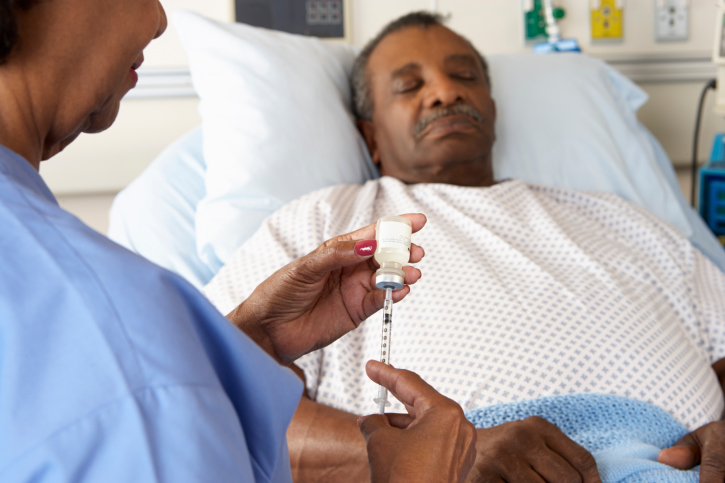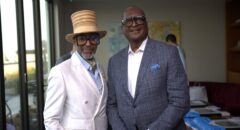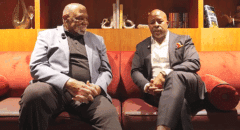 Getting men to see their doctor is only half the battle. To win the war, men must also communicate and cope with their doctor's findings, whether they are favorable or not. Of course, this is easier said than done. In a culture that conditions men to take pain and "man up" it can be difficult to get these same strong men to speak up about their health. Mark Fleming, M.D. witnessed this firsthand in his own family with his father. "He had actually been diagnosed for many years [before I found out]," shared Dr. Fleming of Virginia Oncology Associates in a recent interview with BlackDoctor.org.
Getting men to see their doctor is only half the battle. To win the war, men must also communicate and cope with their doctor's findings, whether they are favorable or not. Of course, this is easier said than done. In a culture that conditions men to take pain and "man up" it can be difficult to get these same strong men to speak up about their health. Mark Fleming, M.D. witnessed this firsthand in his own family with his father. "He had actually been diagnosed for many years [before I found out]," shared Dr. Fleming of Virginia Oncology Associates in a recent interview with BlackDoctor.org.
Have Prostate Cancer? Consult With Your Doctor If This Trial Is Right For You
"I think what's very common with prostate cancer is how men do not share their diagnosis or do not seek treatment because of the potential implications on their quote "nature". So, I think my father was a classic example of that, in that I was not aware and then he had pretty advanced disease when I was made aware of his diagnosis."
Prostate cancer is the leading cancer diagnosed among men in the United States and Black men in America continue to have the highest incidence rate of prostate cancer in the world. According to Harvard Medical School, men with a first-degree relative (brother or father) with prostate cancer, as is Dr. Fleming's history, are more than two-and-a-half times as likely to develop the disease as a man with no affected family members. Black men also lead in mortality statistics, which some experts attribute to late detection.
It could be the shock of receiving a cancer diagnosis or lack of education about what the diagnosis means for their future, but many men are left feeling like, "Now what?"
Dr. Fleming explains that once a patient is diagnosed with prostate cancer, several factors such as the patient's age, lifestyle and other co-morbidity factors (heart disease, diabetes, etc.) must be taken into consideration. "You have a wide array of options and I usually will tell people there is no "best" treatment strategy for prostate cancer. It's the best treatment strategy for YOU."
The following are options and things to consider that your physician or urologist may share with you.
Active Surveillance
"Active surveillance implies an active program where you and your physician [develop] a strategy to monitor your disease, checking PSAs, checking digital rectal exams, and if there's a change in those variables then that might prompt you to do another biopsy and then prompt you to do some of the treatments which we'll discuss."
Surgery
The surgical removal of part or all of the prostate is called a prostatectomy and Dr. Fleming notes there are two types - the open prostatectomy and the robotic (laposcopic). When it comes to considering between the two, Dr. Fleming says the question isn't which one, but rather, which doctor performs the procedure on a regular basis. "Typically, you want a physician who's probably done more than 50 to 100," he cautions. If you call for an appointment and the doctor can't book you until the following month, that's a great sign. "That implies that they're booked out that far opposed to 'I can do it tomorrow,' that means they're not that busy." Having a busy doctor is a good thing in this case. Good physicians are kind of like good restaurants - it's okay to have to make a reservation."
Love Is...Exploring All Your Options For Prostate Cancer Treatment
Consider Your Relationship
One of the lifestyle factors men and their doctors must consider is sexual potency. Treatment options should be a joint decision because as Dr. Fleming points out, "it has broad implications upon their relationship or potentially from that standpoint. So, it's great when your partner is involved, either male or female partner, in terms of your decision."
In evaluating your next steps and treatment options, Dr. Fleming believes the decisions made should not be rushed. There is no one-size-fits-all best treatment, so you want to make the choices that are best for your situation and health. "Sometimes people want things done yesterday because they got a diagnosis of cancer but the reality for prostate cancer [is] you waiting weeks to make the appropriate decision is probably more important than making a decision in hours our days."
Looking for more information? Consult with your doctor if this trial is right for you.









